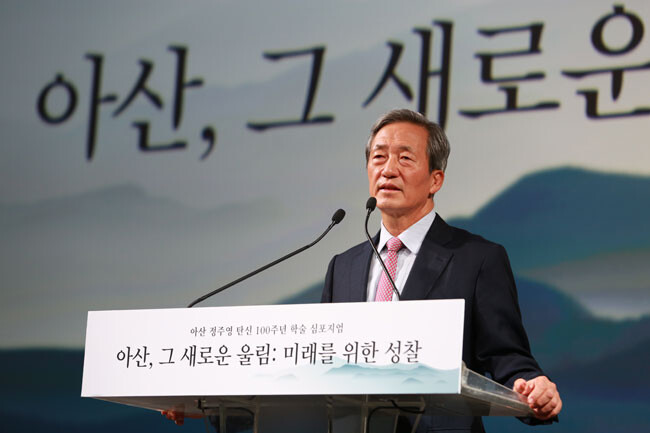
Seoul – Chung Mong-joon, Honorary Chairman of the Asan Institute for Policy Studies, has called for the establishment of a collective defense organization similar to NATO among Asian nations, including South Korea and Japan. Speaking at the Asan Plenum 2025 in Seoul on May 23rd, Chung emphasized the urgent need for such an alliance to counter the escalating threats in the region.
"Today, the most significant threat to our country is not Japan, but North Korea's communist and hereditary regime," Chung stated. He stressed the necessity for stronger nuclear deterrence guarantees and collective security measures to prevent aggression and miscalculation. Chung highlighted North Korea's recent actions, including the unveiling of tactical nuclear weapons, nuclear submarines, numerous ballistic missile tests, and the dispatch of thousands of soldiers to the frontlines of the Ukraine war, as evidence of the heightened security risks.
Chung also reiterated his previous call for the redeployment of U.S. tactical nuclear weapons to the Korean Peninsula. "We must be prepared to 'imagine the unimaginable' to counter the threats posed by North Korea, supported by China and Russia," he asserted.
Echoing Chung's concerns, former U.S. Deputy Secretary of State Kurt Campbell, a keynote speaker at the forum, acknowledged the necessity for the U.S. to reaffirm its nuclear deterrence commitment to allies like South Korea and Japan to prevent nuclear proliferation in Asia. Campbell suggested considering the forward deployment of U.S. nuclear assets to maintain regional peace and stability.
Campbell further advocated for South Korea to assume a more significant role in regional security beyond defending against North Korean aggression. He expressed support for South Korea's inclusion in key international forums such as the G7 and the Quad, recognizing its growing global influence.
The proposal for an Asian NATO-like alliance reflects concerns about both North Korea's nuclear ambitions and China's growing regional assertiveness. Chung Mong-joon questioned whether Russia would have invaded Ukraine if it were a NATO member, underscoring the importance of a robust collective defense framework. He suggested the formation of an Indo-Pacific Treaty Organization (IPTO), potentially including South Korea, Japan, Australia, the Philippines, and India.
However, the establishment of such an alliance faces challenges, particularly regarding historical tensions between South Korea and Japan. Chung acknowledged the complex history but emphasized the progress made in bilateral relations over the past 60 years since the normalization of diplomatic ties. Japanese Ambassador to South Korea, Mizushima Koichi, also stressed the importance of cooperation among like-minded nations sharing common values such as democracy, the rule of law, and free trade.
South Korea's Foreign Minister, Cho Tae-yul, while acknowledging the need for international cooperation, cautioned against a binary choice between the U.S. and China. He emphasized the importance of maintaining a balanced relationship with China based on mutual respect and common interests.
The Asan Plenum 2025, themed "80 Years of Liberation, 60 Years of Korea-Japan Normalization," brought together over 50 global experts, including former U.S. Deputy Secretary of Defense Paul Wolfowitz, former World Bank President, and other prominent figures in diplomacy and security. The forum underscored the urgent need for enhanced regional security cooperation in the face of evolving geopolitical challenges.
[Copyright (c) Global Economic Times. All Rights Reserved.]






























